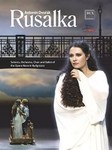|
Back
11/03/2017
Antonín Dvorák: Rusalka, opus 114
Magdalena Polkowska (Rusalka), Tadeusz Szlenkier (the prince), Jacek Greszta (the water-gnome), Darina Gapicz (Jezibaba), Katarina Nowak-Stanczyk (the foreign princess), Pavlo Tolstoy (gamekeeper), Victoria Vatutina (turnspit), Krystyna Nowak, Marta Ustyniak, Ewa Banasiak, Mariola Winkler-Koltys, Lidia Golinska, Dorota Sobczak (wood-sprites), Orchestra, Choir and Ballet of the Opera Nova in Bydgoszcz, extras and children, Henryk Wierzchon (chorus master), Maciej Figas (conductor), Kristina Wuss (stage director), Mariusz Napierala (set and costume designer), Maciej Igielski (lighting designer), Krystian Drywa (multimedia projections), Iwona Runowska (choreographer), Marek Czajkowski (video executive producer)
Recording: Opera Nova, Bydgoszcz, Poland (April 28, 2012) – 133’30
Dux #DUX 8178 – Dolby Digital 5.1 – Picture format 16:9 – Region 0 – Booklet in Polish, English and German – Subtitles in Polish, English and German (Distributed by Naxos of America)

   
Antonín Dvorák’s lyric fairy tale is realistically jettisoned to Poland, falling upon a riverbank instead of an enigmatic lake. We learn a lot about the town of Bydgoszcz (better known as Bromberg in German) in more ways than one. Gone are the horrific remnants of the city’s 1939 Bloody Sunday. Instead, Kristina Wuss’ atmospheric glances mesh historical elements via Mariusz Napierala’s sets and costumes in an objective to cram Polish history onto one page (and one stage), adding confusion while exacerbating confoundedness. On the other hand, the execution is sincere and embracing with support mechanisms trending towards richness and depth.
Impressive in scope is Maciej Figas’ brilliantly grounded musical blanket that provides itchy impulsiveness which churns the gears in anxious excitement. We witness a pace that magically lifts notes right off the stand and spins the viewer into a mesmerizing channel. The rock-solid performances within this slim list of principals aid in effectiveness of presentation and likeability.
Despite being short of an exact Google Map replicate, Ms. Wuss centers all acts on and/or under The Jerzy Sulima-Kaminsky bridge which crosses the Brda River. The sextet of diaphanous nymphs propels the storyline at a rambunctious pace while Magdalena Polkowska’s Rusalka flitters around and in the aqueous current with a smoky glistening edge. Idyllically-coined the “Little Berlin”, Bydgoszcz’s skyline honors old and new landmarks. Monuments and statues frequently pop up inside Napierala’s ethereal sphere. In this case, Jerzy Kedziora’s sky bound sculpture, “Man Crossing the River”, actually comes to life as the Water-gnome: Jacek Greszta’s tone of broad authority gives stable sense amidst a mythical legend that takes an ominous turn, though he shies away from searing excessiveness.
Contrastingly, Darina Gapicz’s Jezibaba saunters in and out of the entire production. Dressed in a burnt-brown maxi-overcoat, Napierala sizes her more up like a Toulouse-Lautrec painter with overly exercised sadistic overtures that really work: more palpable fear dwells inside this witch.
No way do we see signs of a palace inside Act II, rather we have a lovely pseudo contemporary turn-of-the-century trolley car that generates movement and activity on a single pair of tracks. The flurried crowd scene has a predominant grounding reaching back to the Victorian Era with angles into other oblique epochs.
The fretful turnspit (Victoria Vatutina) and gamekeeper (Pavlo Tolstoy) oddly suggest kitchen preparations at the court by having cooking pots dangeled around their necks. In the middle of the street several characters walk around holding framed paintings to ponder the canaled hamlet in the days of yore. Inside the “Polonaise”, we find an amalgam of vastly different vętements which, initially, present a puzzlement. After revisiting this scene, the costume selection is another persistent, mnemonic reminder of earlier historic periods. In a way, Kristina Wuss gets more hung up on obedience to Polish history than characters performing inside a politely fashioned fantasy.
On balance, Iwona Runowska swirls cast members in exceedingly beautiful positions although the Polish dance is quite sloppy and an ultimate letdown. [Note: As an aside, Józef Balinski’s write-up concerning the “approach” of this production is poorly translated into English and doesn’t congeal great meaning...it adds more befuddlement.]
Looking like a youthful teenager, Tadeusz Szlenkier’s lightly steely pitch brings forth a modicum of courteously monitored amorousness, hinting at a naďve young man who weighs more on being a benevolent prince rather than a vindictive homme. It’s not until Act II when we’re introduced to brassy Katarina Nowak-Stanczyk as the Foreign Princess, sashaying around a billiard table brandishing a snooker cue, and sleazily garbed as a bar maid, pushing her back into the Gold Rush days. This “royal” fitting is blatantly incongruous although the reasoning emphasizes her distasteful debauchery.
Choral responses under the direction of Henryk Wierzchon pulsate with vibrancy and well-balanced blending. However, the ballet, under Ms. Runowska, is as modern as the Opera Nova venue (unofficially completed in 1994), situated a mere block or two away from the opera’s trestle structure. While Act II’s female contingency gathers in antique cloth, dancers react abstractly, reminiscent of the Alvin Ailey Dance Theatre.
The Dux label executes superb cinematic editing, and the sound quality is absolutely first-rate. For centuries Poland has been overburdened by its share of wars, occupations, plights and struggles, but to try and swoop the past into one cohesive production frustrates, confuses and loses the viewer. Nonetheless, this Rusalka pulls from water’s depths a posh delivery to honor the legacy of Antonín Dvorák.
Christie Grimstad
|